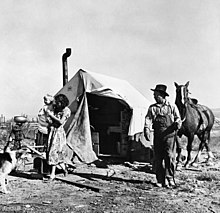Federal Writers' Project – Life Histories/2021/Fall/Section009/Dan Smith
Overview
[edit | edit source]
Dan Smith was interviewed Covington Hall, on December 7, 1938 as part of the Federal Writer's Project.
Biography
[edit | edit source]Personal Life
Dan Smith lived with his wife and three children, one son and two daughters, running a store on his own and farms for living. He went outside his residence a lot, but still chose to stay in the mountain, where he was raised and grew up. Dan was always a quiet-mannered person and never used an oath. He was nice and kind to his friends and neighbors, who borrowed money from Dan. He never forced them to pay the money back immediately, instead, he just sent a note with polite reminders. When he felt stressed about his work, he never complained and released the pressure just by smoking, drinking beers, and reading farm journals. He liked fishing, which was his only recreation, and preferred fishing to politics. What’s more, he seldom talked about the religions. He considered to be a Holy Roller, though he was not yet.
Professional Life
Dan Smith worked for his own store and farms. Apart from that, he and his family also did some laundry for the wealthier residents. His home and store are all under one roof. The house entered through the store, which was stocked with country merchandise. A storehouse for coal oil and other commodities was on the left of the building. The Smiths own an automobile, a mule, cows and chickens, which with with the store and farm and washing and peddling, enable them to get by. Although Dan was gassed during the world war, which made him harder for work, he still faced the hard times with smile and never complained. He was not of the complaining sort. When he felt stressed about his work, he was likely to smoke, drink some beer, or read some farm journals to relax.
Social Issues
[edit | edit source]Farmers' life during the Great Depression
[edit | edit source]During World War I, farmers worked hard to produce record crops and livestock. When prices fell they tried to produce even more to pay their debts, taxes and living expenses. In the early 1930 prices dropped so low that many farmers went bankrupt and lost their farms. In some cases, the price of a bushel of corn fell to just eight or ten cents. Some farmers became angry and wanted the government to step in to keep farm families in their homes. In other areas around the state, farmers banded together like a labor union and threatened to prevent any milk from getting from farms to towns and cities. They hoped that this would raise the price that farmers were paid for their products. They set up blockades on country roads and made any trucks carrying milk, cream, butter or other farm products to turn around and go back home. They called it “The Farm Strike.” Not all farmers joined the movement, however, and the effort did not have any effect on prices. In some families the farm wife made clothing out of the cloth from flour and feed sacks. They learned how to get by with very little money. But they had to pay their taxes and debts to the bank in cash. These were tough times on the farms.
Negative Impact of World War I on people
[edit | edit source]Loss of life:
[edit | edit source]World War One is the second most brutal war fought in modern history. By the end, over 9 million soldiers and 11 million civilians were dead. Countries lost enormous chunks of their population to famine and combat. The Ottoman Empire alone lost 20% of its population!
New Horrific Forms of Warfare:
[edit | edit source]If the sheer brutality of guns were not enough, both sides introduced new weapons and strategies. For the first time, humans used chemical weapons in war. Mustard Gas annihilated enemy combatants by slowly suffocating and blinding them. Those who survived suffered from blistered skin, respiratory disorders, and vision damage. Artillery barrages became common as well as thousands upon savages decimated enemy fortifications in a matter of minutes.
Famine During and After the War:
[edit | edit source]As a result of blockades and widespread disruption, the war disrupted supply chains across Europe. It took months to reestablish supply lines for many regions leading to starvation even after the war ended.
Bibliography
[edit | edit source]Musbach, Joan W. “Life on a Farm during the Great Depression.” OAH Magazine of History 16, no. 1 (2001): 33–43. http://www.jstor.org/stable/25163485.
Smith, John I. “Reminiscences of Farming and Business in the Depression, 1929-1933.” The Arkansas Historical Quarterly 45, no. 4 (1986): 321–29.
https://doi.org/10.2307/40027776.
“Effects of World War 1.” History, October 13, 2020. https://www.historyonthenet.com/effects-of-world-war-1.
“The Positive and Negative Impact of World War I on World History.”Positive Negative Impact, March 6, 2021. https://positivenegativeimpact.com/world-war-1
“Germans Introduce Poison Gas.” History.com. A&E Television Networks, February 9, 2010. https://www.history.com/this-day-in-history/germans-introduce-poison-gas
“The Great Depression Hits Farms and Cities in the 1930s.” Iowa PBS, February 12, 2018. https://www.iowapbs.org/iowapathways/mypath/great-depression-hits-farms-and-cities-1930s
“Folder 30: Hall, Covington (Interviewer): Mountain Merchant-Farmer.” Federal Writers Project Papers. Accessed October 18, 2021. https://dc.lib.unc.edu/cdm/ref/collection/03709/id/912.
